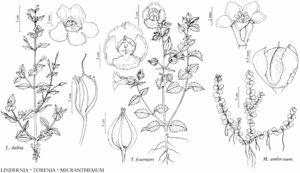Micranthemum umbrosum
Rhodora 17: 131. 1915.
Common names: Shade mudflower baby's tears
WeedyIllustrated
Basionym: Globifera umbrosa J. F. Gmelin Syst. Nat. 1: 32. 1791
Revision as of 19:12, 16 December 2019 by FNA>Volume Importer
Leaves opposite; petiole 0–0.4 mm; blade orbiculate, ovate, or obovate, 2–9 × 1.5–7 mm. Pedicels 0.2–0.9 mm. Flowers chasmogamous; calyx symmetric, 1.2–1.5 mm, tube 0.2–0.4 mm, lobes 0.9–1.1 mm; corolla slightly bilaterally symmetric, weakly bilabiate, ± rotate, 1.3–1.5 mm, shorter than or equal to calyx, tube 0.7–1 mm, abaxial lobe 1, not forming a prominent lip, 0.8–1 mm, lateral 2, 0.6–0.7 mm, adaxial 0.4–0.5 mm. Capsules 1.1–1.2 × 0.9–1 mm. Seeds oblong to narrowly obconic, 0.3–0.4 × 0.1–0.2 mm.
Phenology: Flowering late summer–fall.
Habitat: Swamps, margins of ponds, lakes, and sluggish streams, wet ditches.
Elevation: 0–200 m.
Distribution
Ala., Ark., Fla., Ga., La., Miss., N.C., S.C., Tenn., Tex., Va., West Indies, Central America, South America.
Discussion
Selected References
None.
Lower Taxa
None.
